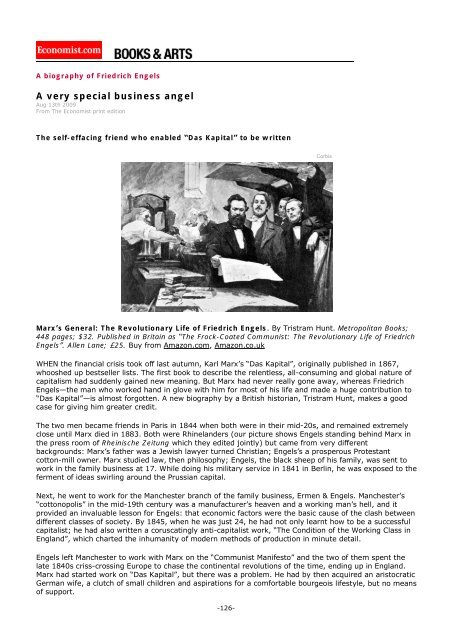Untitled - the ultimate blog
Untitled - the ultimate blog
Untitled - the ultimate blog
You also want an ePaper? Increase the reach of your titles
YUMPU automatically turns print PDFs into web optimized ePapers that Google loves.
A biography of Friedrich Engels<br />
A very special business angel<br />
Aug 13th 2009<br />
From The Economist print edition<br />
The self-effacing friend who enabled “Das Kapital” to be written<br />
Corbis<br />
Marx’s General: The Revolutionary Life of Friedrich Engels. By Tristram Hunt. Metropolitan Books;<br />
448 pages; $32. Published in Britain as “The Frock-Coated Communist: The Revolutionary Life of Friedrich<br />
Engels”. Allen Lane; £25. Buy from Amazon.com, Amazon.co.uk<br />
WHEN <strong>the</strong> financial crisis took off last autumn, Karl Marx’s “Das Kapital”, originally published in 1867,<br />
whooshed up bestseller lists. The first book to describe <strong>the</strong> relentless, all-consuming and global nature of<br />
capitalism had suddenly gained new meaning. But Marx had never really gone away, whereas Friedrich<br />
Engels—<strong>the</strong> man who worked hand in glove with him for most of his life and made a huge contribution to<br />
“Das Kapital”—is almost forgotten. A new biography by a British historian, Tristram Hunt, makes a good<br />
case for giving him greater credit.<br />
The two men became friends in Paris in 1844 when both were in <strong>the</strong>ir mid-20s, and remained extremely<br />
close until Marx died in 1883. Both were Rhinelanders (our picture shows Engels standing behind Marx in<br />
<strong>the</strong> press room of Rheinische Zeitung which <strong>the</strong>y edited jointly) but came from very different<br />
backgrounds: Marx’s fa<strong>the</strong>r was a Jewish lawyer turned Christian; Engels’s a prosperous Protestant<br />
cotton-mill owner. Marx studied law, <strong>the</strong>n philosophy; Engels, <strong>the</strong> black sheep of his family, was sent to<br />
work in <strong>the</strong> family business at 17. While doing his military service in 1841 in Berlin, he was exposed to <strong>the</strong><br />
ferment of ideas swirling around <strong>the</strong> Prussian capital.<br />
Next, he went to work for <strong>the</strong> Manchester branch of <strong>the</strong> family business, Ermen & Engels. Manchester’s<br />
“cottonopolis” in <strong>the</strong> mid-19th century was a manufacturer’s heaven and a working man’s hell, and it<br />
provided an invaluable lesson for Engels: that economic factors were <strong>the</strong> basic cause of <strong>the</strong> clash between<br />
different classes of society. By 1845, when he was just 24, he had not only learnt how to be a successful<br />
capitalist; he had also written a coruscatingly anti-capitalist work, “The Condition of <strong>the</strong> Working Class in<br />
England”, which charted <strong>the</strong> inhumanity of modern methods of production in minute detail.<br />
Engels left Manchester to work with Marx on <strong>the</strong> “Communist Manifesto” and <strong>the</strong> two of <strong>the</strong>m spent <strong>the</strong><br />
late 1840s criss-crossing Europe to chase <strong>the</strong> continental revolutions of <strong>the</strong> time, ending up in England.<br />
Marx had started work on “Das Kapital”, but <strong>the</strong>re was a problem. He had by <strong>the</strong>n acquired an aristocratic<br />
German wife, a clutch of small children and aspirations for a comfortable bourgeois lifestyle, but no means<br />
of support.<br />
-126-








![[ccebbook.cn]The Economist August 1st 2009 - the ultimate blog](https://img.yumpu.com/28183607/1/190x252/ccebbookcnthe-economist-august-1st-2009-the-ultimate-blog.jpg?quality=85)



![[ccebook.cn]The World in 2010](https://img.yumpu.com/12057568/1/190x249/ccebookcnthe-world-in-2010.jpg?quality=85)
![[ccemagz.com]The Economist October 24th 2009 - the ultimate blog](https://img.yumpu.com/5191885/1/190x252/ccemagzcomthe-economist-october-24th-2009-the-ultimate-blog.jpg?quality=85)